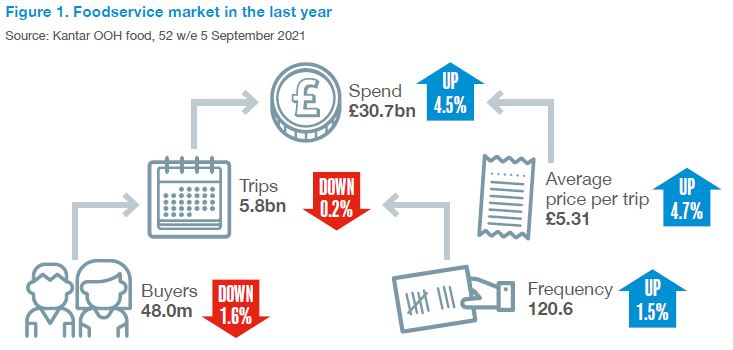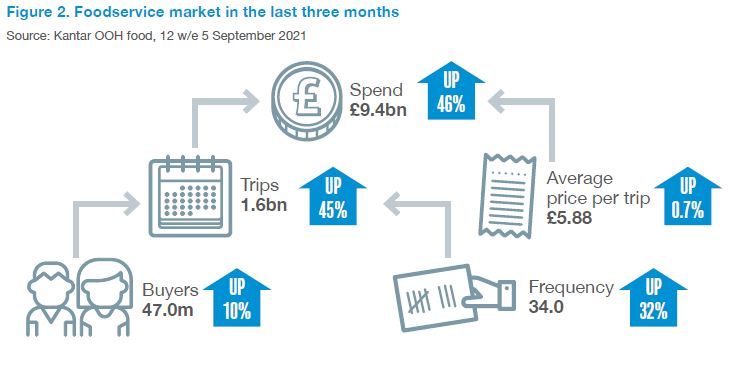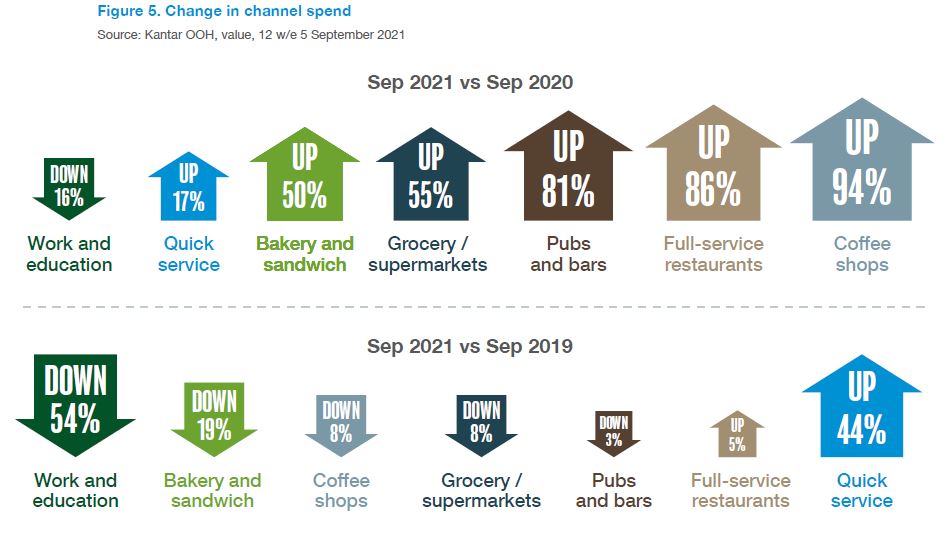- Home
- Knowledge library
- Consumer Insights: Foodservice 2021 Recovery, challenges and opportunities
Consumer Insights: Foodservice 2021 Recovery, challenges and opportunities
The British foodservice market has seen a lot of turbulence over the last two years. COVID-19 has caused closures or reduced capacity, and there have been supply-chain and staffing challenges due to the pandemic and the UK’s exit from the EU.
As we start 2022 with fewer restrictions than before, how quickly will the foodservice market recover, and what opportunities are there to aid this?
This report covers foodservice market recovery, how the demand for proteins out-of-home has been impacted by the pandemic, and challenges and trends which are impacting the foodservice market. The report looks at data up until 5 September 2021. To keep on top of the latest market performance please visit AHDB’s foodservice dashboards which are updated quarterly. See our Agri-market outlook for our predictions for the foodservice market in 2022.
Key findings for red meat
- Burgers remain one of the most popular dishes on menus. However, beef will need to continue to capitalise on this, as it has been losing share of total burgers as consumers switch to chicken.
- Encourage shoppers to trade up to steaks. These higher price cuts drive up both value and volume of beef. With the right use of promotions, consumers can be tempted to trade up.
- Pork can continue to appeal through takeaways by expanding from quicker lighter meals to takeaway breakfasts and evening meals.
- As pork is more reliant on food-to-go, it could struggle if people do not return to work full time. However, there are also opportunities to appeal in home.
- Transitioning lamb to more world cuisines and flavours could reinvigorate the protein and increase menu space and demand.
- Lamb needs to retain the shoppers it has gained over lockdown as other channels increase their delivery capabilities kebabs and Indian takeaways may face more competition.
Challenges
-
Inflation - In October 2021, inflation was at 3.8% (ONS). If inflation stays high or rises, discretionary spend on eating out would likely be impacted.
-
Consumer and business confidence - Consumer Confidence slipped backwards in December 2021 (Gfk) as consumers become more concerned about the economic situation in the next 12 months.
-
Labour shortages - One in six hospitality jobs are currently vacant (CGA, Q3 2021). This has impacted many businesses, which may have to reduce the number of covers or provide a scaled-back service.
-
New high-fat, salt and sugar calorie labelling - New regulations from the Government require some restaurants, cafés and takeaways in England to list calorie counts on non-prepacked food and soft drinks.
-
Supply-chain logistical challenges - Implementation of new UK border measures have added further complexity to supply chains and this has resulted in suspension of some menu items for big brands.
-
Evolving consumer behaviour - There is a general movement back to pre-pandemic patterns as well as some behaviours which have changed for the long term. Re-focus on pre-pandemic trends, as well as address new ones.
-
New trade deals - While new trade deals provide opportunities for UK exports, they also open our domestic market to increased competition.
Trends
-
Simplified menus - The average number of dishes on menus has dropped by 22% between spring/summer 2019 and spring/summer 2020 according to research from Lumina Intelligence.
-
Widening value spectrum - One in 10 consumers plan to visit cheaper restaurants when eating out (Lumina Intelligence, May 2021). Consumers are happy to pay more for high-quality experiences and food.
-
Continued working from home - A third of working adults are working some days from home (ONS). Food-to-go operators can cater to home-based workers as they still venture out, especially when meal fatigue kicks in.
-
Digitalisation – Of delivery customers, 53% had not bought into delivery before the pandemic (Kantar). Consumers now rely on digital tools before, during and after their visit when eating out (CGA)
-
Evolving heath and dietary needs - On menus, 47% of main dishes are flagged with a dietary requirement (Lumina Intelligence). Vegetarian and vegan dishes account for 27% of dietary requirements flagged on menus.
-
Sustainability - Two in five consumers say they are willing to spend extra if ingredients are sustainably sourced. 53% of consumers likely to order meals that have evidence of quality and sustainability awards.
-
Provenance - British mentions on dishes are low, at only 1.2% (Lumina Intelligence Autumn/Winter 2019). But desire is there, with 77% of consumers agreeing that they prefer buying food grown or produced in the UK.
-
Socialisation and escapism - Making a dining experience more of a social event has proved popular. While capturing people during seasonal events remains crucial for foodservice operations.
Key Graphics



While AHDB seeks to ensure that the information contained on this webpage is accurate at the time of publication, no warranty is given in respect of the information and data provided. You are responsible for how you use the information. To the maximum extent permitted by law, AHDB accepts no liability for loss, damage or injury howsoever caused or suffered (including that caused by negligence) directly or indirectly in relation to the information or data provided in this publication.
All intellectual property rights in the information and data on this webpage belong to or are licensed by AHDB. You are authorised to use such information for your internal business purposes only and you must not provide this information to any other third parties, including further publication of the information, or for commercial gain in any way whatsoever without the prior written permission of AHDB for each third party disclosure, publication or commercial arrangement. For more information, please see our Terms of Use and Privacy Notice or contact the Director of Corporate Affairs at info@ahdb.org.uk © Agriculture and Horticulture Development Board. All rights reserved.




